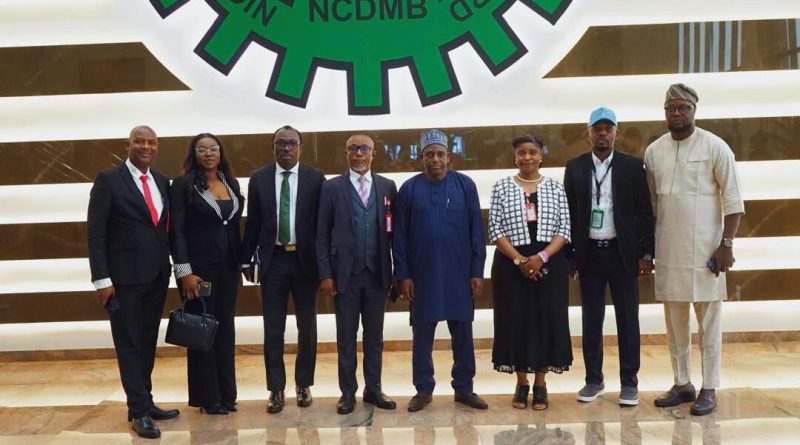NCDMB, NDDC hold knowledge sharing session, commit to collaboration
In the pursuit for improved corporate governance, enhanced performance and effective service delivery to the nation and citizens, the Nigerian Content Development and Monitoring Board (NCDMB) and the Niger Delta Development Commission (NDDC) on Tuesday held a knowledge exchange session, leading to a strong committing to inter-agency collaboration, peer review of operations.
The session held at the Nigerian Content Tower (NCT), Swali, Yenagoa, Bayelsa State, and was attended by select management staff of the NDDC. The Executive Secretary of the NCDMB, Felix Omatsola Ogbe, spoke through the Director, Corporate Services, Abdulmalik Halilu, and observed the benefit of having a review system whereby sister organisations periodically compare notes and evaluate each other’s performance with a view to identifying and eliminating weaknesses.
The NCDMB Executive Secretary appreciated the Commission’s recognition of the Board as “the number one institution” for a peer review mechanism, noting that the engagement would serve as “a two-way traffic” where the Board could gain useful insights from the NDDC team to improve its own standards, while it shared its own experience and knowledge with the visitors.
“Let us compare notes and adopt what works,” he stated, pointing out that “Sessions like this” exemplify “what institutions should be doing to improve service delivery to stakeholders,” which he listed as government, the Nigerian people, communities and oil and gas companies.
In regard to governance framework, the Executive Secretary threw light on some salient aspects, noting that NCDMB has an Anti-Corruption Unit that helps to identify vulnerable areas, and that the Board is “always on the pathway towards continuous improvement.” According to him, “some of the automation in Human Resources, management systems and several other automated activities are all products of periodic system checks.”
Mr Ogbe said the NCDMB and NDDC have a number of areas where collaboration would be mutually beneficial in furthering their respective statutory responsibilities. Themultibillion-naira Oloibiri Oil and Gas Museum and Research Centre, he noted, is a project where the Commission’s involvement is expected, especially after the NDDC’s Management made such a pledge at the groundbreaking ceremony in February 2023.
He also drew attention to the Board’s “Community Content Guideline,” which he explained is part of corporate strategy to have host communities integrated into the oil and gas value chain, through employment and business opportunities for youths, funding and policy support for contractors, and establishment of project offices, among other things, as stipulated by the Nigerian Oil and Gas Industry Content Development (NOGICD) Act, 2010.
The Board, he explained, has also instituted a “Back-to-the-Creeks” initiative, which seeks to provide targeted interventions in oil- and gas-producing communities to empower youths through skills acquisition and appropriate incentives, and motivation of teachers in schools within rural communities through provision of adequate educational infrastructure.
According to him, “The more we invest in young talents in host communities the more they are made available to participate in the oil and gas activities, and as we build entrepreneurs… they are integrated into the oil and gas supply chain.”
In his own response, NDDC’s Director of Corporate Governance, Mr Anele Stephen Nzelaw, commended the NCDMB for its exceptional performance and accomplishments within a short space of time. He said his team was at the corporate headquarters of the NCDMB to learn “those things that have made your organization achieve so much within such a short period.”
Citing “the world-class fabrication and construction yards” that have emerged with the advent of the NOGICD Act and the Board, and “massive programmes of human capital development,” he noted, “You’ve been around for only 15 years.” His organisation, according to him, could learn from the Board.
The NDDC director disclosed that the new Management was poised for far-reaching reforms, that having been around for 25 years with mixed results, the present Management thinks that “it is time to move our businesses from a transactional dimension to a strategic transformational level.”
In furtherance of that plan, he noted, the Commission decided to develop a governance framework by engaging a foremost organisation, KPMG. Such a framework, he explained, would ensure continuity of policies and programmes. He said that the governance framework of the NCDMB, as well as strategies, internal controls, and accountability measures were of especial interest to his team.
The addresses were followed by presentations on a variety of topics. Dr Zuwairat Azekome, Supervisor, Transformational Projects, of the NCDMB, spoke on “NCDMB’s Governance Framework, Projects and Programme Implementation”; Ms Onajero Osiebe, General Manager, Human Resources Division, spoke on “Capacity for Governance and Organisational Discipline”.
Similarly, Ms Seleke-Ere Owoupele, Manager, SERVICOM, made a presentation on “NCDMB Service Level Charter and the Journey to the Top of Transparency Ranking,” while Ms Mercy Azibayam Egba, Supervisor, Audit, spoke on NCDMB’s Internal Audit processes.
The visit was concluded with a guided tour through different sections of the Nigerian Content Tower, including the Technology Innovation and Incubation Centre, and the 1,000-capacity ultramodern Conference Centre.


